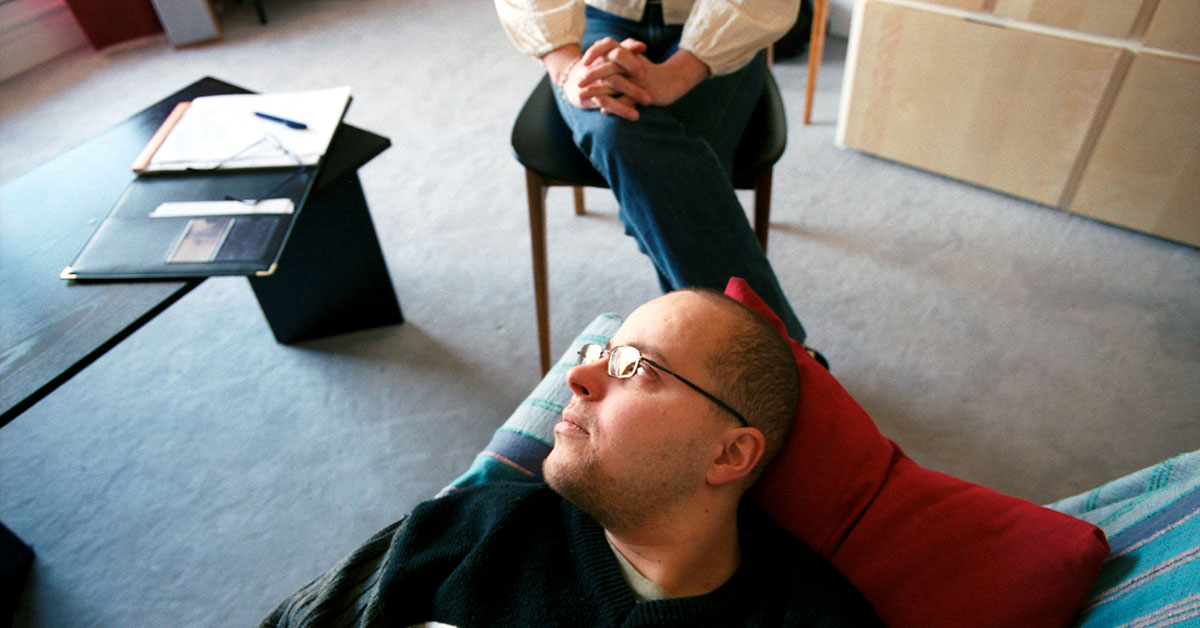If you are struggling with an eating disorder, you know that it can be a difficult thing to overcome. You may feel like you are in control one day, and completely out of control the next. This is because eating disorders are often characterized by mood swings and impulsivity. However, there is hope. Dialectical behavior therapy (DBT) is an effective treatment for eating disorders. In this blog post, we will discuss how DBT can help you overcome your disorder and regain control of your life.
Contents
What Are Eating Disorders?
 Eating disorders are serious mental illnesses that can hurt a person’s physical and mental health.
Eating disorders are serious mental illnesses that can hurt a person’s physical and mental health.
There are four main types of eating disorders: anorexia nervosa, bulimia nervosa, binge-eating disorder, and avoidant/restrictive food intake disorder.
Anorexia nervosa is characterized by self-starvation and an intense fear of gaining weight. Bulimia nervosa is characterized by recurrent episodes of binge-eating followed by purging (self-induced vomiting or the use of laxatives). Binge-eating disorder is characterized by recurrent episodes of binge-eating without purging. Avoidant/restrictive food intake disorder is characterized by avoidance of certain foods due to a lack of interest in eating or an aversion to certain textures or smells.
There can be many negative impacts of having an eating disorder. These impacts can be physical, mental, or emotional.
Some of the physical impacts of having an eating disorder include:
-weight loss or gain
-fatigue
-gastrointestinal problems
– Amenorrhea (loss of menstruation in women)
Some of the mental and emotional impacts of having an eating disorder include:
-mood swings
-irritability
Eating disorders can also impact a person’s social life. A person with an eating disorder may avoid going out with friends or family because they are self-conscious about their body or they don’t want to eat in front of others.
If you or someone you know is struggling with an eating disorder, there is help available. The first step is to talk to a doctor or mental health professional. They can provide you with a diagnosis and create a treatment plan that is right for you.
How To Treat Eating Disorders?

Treating an eating disorder requires a comprehensive and individualized approach. Depending on the severity of the disorder, different types of treatment may be recommended.
Medications
Medications are one treatment option for eating disorders. Antidepressants, antipsychotics, and mood stabilizers may be prescribed to help stabilize mood and treat any underlying psychiatric conditions.
Individual Therapy
Working with a therapist can be an important part of treatment for an eating disorder. Individual therapy can help address the underlying issues that contribute to disordered eating behaviors.
Group Therapy
Group therapy is another form of treatment that can be helpful for people with eating disorders. In group therapy, individuals share their experiences and learn from each other in a supportive environment.
Family Therapy
Family therapy is another type of treatment that may be recommended for individuals with eating disorders. This Family therapy can help family members understand the disorder and how to support their loved ones in recovery.
Nutritional Counseling
Nutritional counseling is an important part of treatment for eating disorders. A registered dietitian can help develop a healthy meal plan and provide guidance on nutrition and eating behaviors.
Hospitalization
In some cases, hospitalization may be necessary to treat an eating disorder. Hospitalization can provide a safe environment for individuals to receive intensive treatment.
Dialectical Behavior Therapy for Eating Disorders

Dialectical behavior therapy (DBT) is a type of therapy that can be used to treat eating disorders. DBT focuses on helping people learn skills to manage their emotions and cope with difficult situations. DBT is effective in treating eating disorders and other mental health conditions.
Dialectical behavior therapy is a type of cognitive-behavioral therapy. It was developed in the 1980s by Marsha Linehan, a professor of psychology at the University of Washington. DBT is based on the idea that people are capable of change and that they can learn new skills to manage their emotions and cope with difficult situations.
Sometimes there are also many other people in the room and it can be very intimidating. But with DBT you will learn how to eat more mindfully and eventually the eating disorder thoughts will go away.
Techniques of Dialectical Behavior Therapy

There are many techniques of DBT, but some of the most commonly used ones are:
Mindfulness
Mindfulness is a technique that helps you focus on the present moment and accept your thoughts and feelings without judgment. This technique is also a core component of DBT. Mindfulness is also about being aware of your surroundings and the people in them. There are many different ways to do mindfulness but a therapist will help you find the best way for you.
Cognitive-behavioral therapy
CBT is a type of therapy that helps you change your thinking patterns and behaviors. CBT is effective in treating eating disorders and other mental health conditions.
DBT combines CBT with mindfulness and other techniques to help people manage their emotions and cope with difficult situations.
Interpersonal Effectiveness Skills
Interpersonal effectiveness skills are skills that can help you communicate effectively, set boundaries, and assert yourself in relationships. These skills can be useful in managing your eating disorder and other areas of your life.
Therapists who specialize in treating eating disorders often use DBT to help their clients overcome their disorders. If you think DBT might be right for you, talk to your doctor or therapist about it.
Emotional Regulation
Emotional regulation is the process of learning how to manage your emotions. This can be done through different techniques such as mindfulness, CBT, and interpersonal effectiveness skills. It also makes it a lot easier to stick to your treatment plan. There are also many other benefits to emotional regulation.
Distress Tolerance
Distress tolerance is a set of skills that can help you cope with difficult situations and emotions. This can be helpful when you are dealing with your eating disorder and other stressful situations in your life. Also, learning distress tolerance skills can help you avoid relapse. It can be difficult to learn these skills on your own, but a therapist can help you.
How To Find DBT Therapists For Eating Disorders?
Finding a DBT therapist can be tricky but there are a few ways to do it. You can look online for therapists who specialize in DBT or eating disorders. You can also ask your doctor or mental health professional for a referral.
These are some tips to find a DBT therapist:
Education
Look for a therapist who has a degree in psychology, social work, or counseling. Many DBT programs offer certification for therapists. Sometimes there are also training programs for therapists who want to learn DBT. One should also make sure that the therapist has experience working with eating disorders.
Credentials
It is important to make sure that the therapist you are seeing is credentialed. This means that they have met certain standards set by the state in which they practice. You can usually find this information on the therapist’s website or by calling their office. There are also many online directories that list credentialed therapists.
Specialization
When you are looking for a therapist, you should make sure that they specialize in the treatment of eating disorders. This means that they have experience and training in treating this type of disorder. You can usually find this information on the therapist’s website or by calling their office.
References
If you know someone who has been in therapy, you could ask them for a reference. This is a good way to find a therapist who specializes in the treatment of eating disorders. You can also look online for reviews of therapists.
Experience
Make sure that the therapist you are seeing has experience treating eating disorders. This can be done by asking them how many clients they have treated with DBT or by reading reviews of their work. There may be some therapist who are new to DBT but have worked with other disorders.
Fee
The fee for seeing a therapist can vary depending on their experience and credentials. It is important to make sure that you can afford the therapy before you begin. You can usually find this information on the therapist’s website or by calling their office.
Insurance
Insurance is a vital part of the DBT for eating disorders treatment process. Many insurance companies will not cover the cost of DBT, but there are options available to those who need it. There are a few things to keep in mind when searching for insurance coverage for BBT.
Benefits of DBT For Eating Disorders

There are many benefits of DBT for people suffering from eating disorders. Some of these are:
Helps To Be More Mindful
DBT For eating disorders helps people to be more mindful of their thoughts and feelings. This can help them to better understand their disorder and how to cope with it. Sometimes it also helps people to be more aware of their triggers and how to avoid them.
Increases Emotional Regulation
DBT also helps to increase emotional regulation. This can be helpful when dealing with the stress of an eating disorder. It can also help people to avoid relapses. Many times it can also give a person a more positive outlook on life.
Helps To Build Self-Esteem
DBT can also help to build self-esteem. This is often one of the first things that people with eating disorders struggle with. By learning how to cope with their disorder, they can start to feel better about themselves. This can lead to improved self-esteem and a more positive outlook on life.
Makes It Easier to Follow Treatment Plans
DBT can also make it easier for people to follow treatment plans. This is because it helps them to be more mindful of their thoughts and feelings. It also helps them to better understand their disorder and how to cope with it.
Gives People More Control Over Their Lives
DBT can also give people more control over their lives. This is because it helps them to be more mindful of their thoughts and feelings. It also helps them to better understand their disorder and how to cope with it. By learning how to cope with their disorder, they can start to feel more in control of their lives.
There are many other benefits of DBT for eating disorders. These are just a few of the most common ones. If you or someone you know is struggling with an eating disorder, please seek help from a qualified therapist. DBT can be a very effective treatment for eating disorders, but it is important to get the help you need from a qualified therapist.
Limitations of DBT For Eating Disorders
If there are benefits of DBT for eating disorders, there are also limitations.
Not Cure For All Eating Disorders
DBT may not be the right treatment for all eating disorders. It is important to talk to a therapist about whether or not DBT is right for you. It also gives it a bad rap because people think that it’s a one size fits all approach when it’s not.
Not A Quick Fix
DBT is also not a quick fix. It takes time to learn the skills and to put them into practice. This can be frustrating for some people who are looking for a quick fix. There may be also some people who want to try DBT but are not willing to put in the work.
Can Be Difficult to Find A Qualified Therapist
It can also be difficult to find a qualified therapist who is trained in DBT. This is because it is a new treatment and not all therapists are familiar with it. You may have to search around to find a qualified therapist in your area.
Not All Therapists Are Created Equal
If you are seeking treatment for an eating disorder, it is important to find a therapist who is well-versed in dialectical behavior therapy (DBT). DBT is a specific type of cognitive-behavioral therapy that has been shown to be highly effective in treating eating disorders. While there are many therapists out there who claim to be experts in DBT, not all of them are created equal.
Conclusion
DBT is one of the most effective treatments for eating disorders, and it can help you overcome your disorder. If you are struggling with an eating disorder, I encourage you to seek out a DBT treatment program. With the right treatment, you can recover from your eating disorder and live a full and healthy life.
If you or someone you know is struggling with an eating disorder, there are many resources available to help. There are many treatment programs that offer DBT, and there are also many support groups and online resources. If you need help, please don’t hesitate to reach out for it. Recovery is possible, and you deserve to live a life free from your eating disorder.
You can also contact us for more information about eating disorders and how they can help you to cure an eating disorder. We are always happy to chat and answer any questions you may have. MantraCare is a therapy app that can be used to help you find help for eating disorders. It is available on the App Store and Google Play. Give it a try today! You may be surprised at just how much better you feel. Thanks for reading. You can also book a therapy or download our free Android or iOS app.


